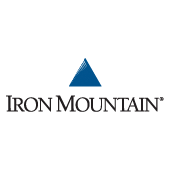Iron Mountain and PwC study suggests that IT’s grip on data could be the biggest obstacle to other functions making the most of information
The ability of senior executives to make effective business decisions could be severely constrained by a lack of access to the company’s most important information, according to a new report by storage and information management company, Iron Mountain (NYSE: IRM) and PwC. Just 46 per cent of senior managers in Europe and North America are permitted access to valuable company information, with results suggesting that the IT department’s control of data could represent the greatest barrier to unlocking the full value of information.
Where information is not only valuable but also highly sensitive (intellectual property, for example, or information containing personally identifiable information), IT has an important role to play in preventing unauthorised access. In other cases, the valuable information could be shared more widely.
The PwC study questioned 1,800 senior business leaders, divided equally between Europe and North America, in mid-sized (over 250 employees) and enterprise-level organisations (over 2,500 employees). Just over two thirds of businesses surveyed (68 per cent) are confident that valuable information can be accessed easily by all those who need it. However, widespread confusion and inconsistency between functions means that this is often not the case. Two-thirds of the businesses surveyed direct employees to the IT department for access to valuable information. Yet 46 per cent do not actually grant IT access to such information, potentially making it more difficult for IT to pass the information on to other functions.
Companies that do allow their IT department access to the most valuable information are more likely to grant such access to a number of other functions, including research and development (35 per cent), finance (35 per cent), records and information management (27 per cent), and marketing (26 per cent), supporting the exploitation of information for insight and value in key business areas.
However, just four per cent extend this access to all employees. Among firms where IT doesn’t hold control over valuable information, access rights for all employees rises to 10 per cent.
“Extracting the full value from information depends on granting the right levels of access to the right people and is likely to include access to valuable information. the identity of the data-gatekeepers can prove critical in how or even whether information is allowed to flow freely to those best placed to use it for business benefit,” said Sue Trombley, Managing Director of thought Leadership at Iron Mountain.
“The IT department plays a vital role in protecting and managing information, but the information dynamic has changed,” explained Trombley. “Businesses now need to strike a balance between managing information to mitigate risk as well as managing it for value. Organisations – and their IT departments – must make sure that those employees best placed to exploit information to support stated business goals can access relevant and appropriate information when they need it. This may require data to be “de-identified” to protect private information before it is made available for analytics. Failure to have a strategy for controlling access can quickly lead to employees coming up with unauthorised and unprotected workarounds to find what they need.”
Richard Petley, director at PwC, comments, “In an environment that is data-rich and technology-savvy, organisations have an opportunity to differentiate themselves by ensuring that the best possible management information is available to the right people at the right time and that this information establishes an accurate and complete picture of their business – one that gives them the confidence to make quicker, bolder and more informed decisions than their competitors.”
The results of the study from Iron Mountain and PwC have been used to create an Information Value Index that measures how well different businesses in different countries currently manage their information for competitive advantage. Organisations can use the findings to explore their own performance and define the practical action they can take to better exploit information.
[su_box title=”About Iron Mountain” style=”noise” box_color=”#0e0d0d”] Iron Mountain Incorporated (NYSE: IRM) is a leading provider of storage and information management solutions. The company’s real estate network of 64 million square feet across more than 1,000 facilities in 36 countries allows it to serve customers around the world. And its solutions for records management, data backup and recovery, document management and secure shredding help organisations to lower storage costs, comply with regulations, recover from disaster, and better use their information for business advantage. Founded in 1951, Iron Mountain stores and protects billions of information assets, including business documents, backup tapes, electronic files and medical data.[/su_box]
Iron Mountain Incorporated (NYSE: IRM) is a leading provider of storage and information management solutions. The company’s real estate network of 64 million square feet across more than 1,000 facilities in 36 countries allows it to serve customers around the world. And its solutions for records management, data backup and recovery, document management and secure shredding help organisations to lower storage costs, comply with regulations, recover from disaster, and better use their information for business advantage. Founded in 1951, Iron Mountain stores and protects billions of information assets, including business documents, backup tapes, electronic files and medical data.[/su_box]
The opinions expressed in this post belongs to the individual contributors and do not necessarily reflect the views of Information Security Buzz.



